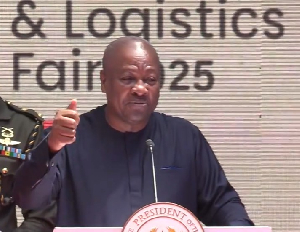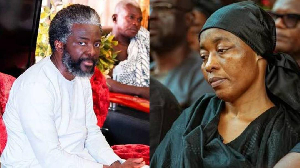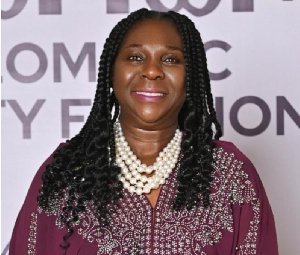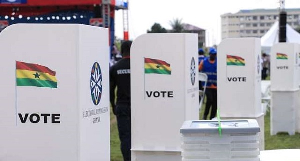Gabby Asare Otchere-Darko
Last week I wrote, "As an ardent believer of a property-owning democracy and a fierce critic of the shameful, lackluster commitment that the NPP showed in realizing this -- its philosophy -- when it was in office for 8 years, my initial reaction was one of great excitement to the news that a public-private-partnership was going to add 200,000 new, decent, affordable homes to the local housing stock. I greeted the news with some chuffy grin of irony: it took a so-called capitalist party to implement a health insurance policy and it is taking a so-called social democratic party to democratize property ownership."
The NPP's founding father, the great man, Joseph Boakye Danquah, saw it as the patriotic duty of the party in government “to liberate the energies of the people for the growth of a property-owning democracy in this land, with right to life, freedom and justice, as the principles to which the Government and laws of the land should be dedicated in order specifically to enrich life, property and liberty of each and every citizen.”
I was one of the biggest critics of the government of President Kufuor's apparent lack of commitment to fulfilling his party's philosophy of democratizing property ownership. Unfortunately, during its first term in office, the NPP effectively ignored this core aspect of their philosophy. The President had once said during his birthday interview with Peace FM's Kwami Sefa-kaye that "ideologies don't matter any longer." With the shredding of the iron curtain and the emergence of a third way, now what matters is what works, he reasoned. Though, he didn't seem to think much of ideology when he was in office, it is refreshing to note that the former President is now actively soliciting funds to establish the Kufuor Institute, a very welcome development. So seeming was the lack of clarity in the NPP's ideological tank that within a week of President Kufuor's re-election in December 2004, Franklin Cudjoe (a founder of the liberal think tank, Imani) observed in his article 'Building a Property Owning Democracy', that "Even though four political parties sought the mandate of the electorate, three of them, all in opposition, had a social democratic agenda whilst the incumbent and re-elected, a liberal democratic party, believed it was practicing a property-owning democracy."
The NPP was opened to ridicule and bashing from the likes of Kwesi Pratt and Tony Aidoo, who were granted a licence by NPP omissions to bastardise the property-owning democracy concept. But, the the 2005 reshuffle which took Hackman Owusu-Agyemang to the Works & Housing Ministry, finally gave some lease of life to the concept. The President gave him the go ahead to put up affordable homes. About $30 million seed money was committed to the eventual target of constructing 100,000 affordable homes in a joint effort by government and local construction firms across the country. It started with a total of 3,500 flats nationwide -- at Borteyman and Kpone in the Greater Accra Region (1,500 flats), Asokore-Mampong in the Ashanti Region (1,192 flats), Koforidua in the Eastern Region (400 flats), Tamale in the Northern Region (400 flats). The construction of an additional 1,500 affordable housing units were to commence in Sekondi, Takoradi, Sunyani, Cape Coast, Wa, Bolgatanga and Ho by 2009.
But, the 2008 manifesto was to set a much more ambitious target of 250,000 affordable housing units within five years, at 50,000 units per year. Earlier in his speech to the Ghana Real Estate Developers Association (GREDA) on Feb 29, 2008, Nana Akufo-Addo, the NPP presidential candidate stated, "if we are indeed committed to fulfilling the basic human needs of food, shelter and clothing, we must succeed in democratising home ownership." He explained his visionary approach to rural-urban migration, "In order to tackle our housing shortage, we must prioritise the revival and improvement of urban AND rural Ghana. We cannot deal responsibly with the rural-urban migration unless we devise and implement development programmes that bring urbanisation to rural Ghana. Thus, rather than allowing the dire socio-economic circumstances to force rural dwellers to move into our city slums, we should take urbanisation to them. Faced with the above situation I wish to throw a challenge to GREDA Members: to find innovative approaches to deal with the large volume of uncompleted buildings all over the country. These uncompleted buildings are holding up capital and affecting negatively our national development. Another challenge is to join government in making homes affordable to the majority of families." Hackman's experiment has shown the way - public-private-partnership but using local firms - affordable homes built by Ghanaians, with Ghanaians for Ghanaians.
The party, in looking forward to a possible post-kufuor NPP government, reduced the 3,500 units it had started to a pilot scheme. One that had informed Government that it can truly modernise Ghana by undertaking mass housing projects through a PPP scheme. Lessons had been learnt. Kufuor had laid the foundation for accelerated modernisation. The first task would be to set up a special Housing the People Scheme which would encourage Ghanaian construction firms to set up consortia with the capacity to undertake major projects; encourage and support the manufacturing and use of alternative local materials; create a vibrant mortgage culture; set up an Affordable Housing Trust Fund, a housing bond and raise money from the capital market for affordable homes. Core to all this was to empower local firms to do the work in fulfilment of the 'Believe in Ghana' concept.
The 2008 NPP manifesto was clear on the need to build up local players in the industry: "The construction industry is crucial to this stage of our national development. We intend to encourage actively Ghanaian contractors to expand their participation in the emerging construction boom, particularly, at the higher end... The industry is currently bedevilled by many operational problems such as the poor classification of contractors, poor quality of work, delays in projects, major cost overruns, inadequate pre-financing arrangements and delays in payment for work done. There is also a serious lack of innovation in the industry, particularly with respect to the development and use of local materials in the construction industry. In its present state, the industry relies almost exclusively on imported materials, which makes the cost of construction projects prohibitive, even for government. The impending developmental needs of the economy demand urgent solutions to the problems of the industry... Developing the industry shall be done by improving the system of classification of contractors, putting in place effective monitoring and evaluation mechanisms to measure the performance of contractors, passing legislation to establish a body that will regulate the sector and merge and classify contractors in Civil Engineering, Building and Road Works. This body [shall be called] the Construction Industry Development Authority (CIDA)..."
The document continued, "A major shift in emphasis in the construction industry will be the aggressive promotion in the use of local materials, such as brick, clay and laterite. This will mean accepting the challenges of developing these locally available resources to acceptable construction standards. The government, in collaboration with research organisations such as the Building and Road Research Institute (BRRI), will make such a development a national priority. Ghana has large deposits of limestone located in Nzema, Krobo and Buipe for the development of a local cement industry. The government will spare no efforts to ensure the exploitation and development of these resources for the benefit of the industry and Ghana."
By 2008, the Government had already acquired land banks totalling 50,000 acres across the country for the Housing the People scheme - something which is today benefiting STX Korea. There was the specific promise, as part of the Northern Development project, to construct at least 13,000 units of decent, affordable housing across the North within the first two years; establish a mortgage culture to provide the loan facilities for more Ghanaians to own their own homes; name every street and number every property within Akufo-Addo's first term; create a new Department of Infrastructure and Physical Planning to ensure better land use and spatial planning in our cities; and, ensure cleaner streets with the development of 20,000 sanitation (Tankase) inspectors per year for the next five years in partnership with the private sector. It would have been the most ambitious mass housing project pledged $1 billion to that to be raised from the capital market.
The question is this: with housing being such a major social issue in Ghana, how come Ghanaians couldn't buy into this NPP promise? Credibility or lack of it, to be precise. Lamenting over this in an article that I wrote in April 2009, my comments on the unsold NPP promise to build 250,000 affordable homes by 2015 were that, "This was a programme if believed and voted for and implemented could have surely modernised Ghana and directly connected the NPP full-square to the needs of the so-called ordinary Ghanaian. It would have provided jobs for tens of thousands and direct homes for a million Ghanaians. The spiraling effect of creating a vibrant mortgage environment, expanding the building materials market and bringing down rents and house prices would have meant greater access to better shelter to some 10 million Ghanaians." The NDC, it seems, have listened and I pray that they get it right and succeed in their version of 200,000 homes, whether or not they can be described as affordable. It may hurt the NPP electorally, but it would help move Ghana forward. The devil, however, is in the details. But, had the NPP taken their own philosophy seriously may be this article would have been academic.
The NDC knew they had NPP on its back on the housing matter. On Wednesday, October 1, 2009, Fiifi Kwettey and his team of young assassins decided to 'set the records straight' with a statement - 'Why Akufo Addo’s Promises Are Not Credible & The Difference Prof Mills Brings'. It read in part: "Let us now cite a few of the myriads of such empty promises and proclamations [the NPP] made in the recent past. The year 2000 manifesto of the NPP outlined the party’s plan to promote home ownership among Ghanaians- (see page 5 of NPP 2000 manifesto). The party also gave the following detail on page 20 of the same manifesto. 'The NPP will ensure the modernisation and availability of urban housing. For instance, subject to the agreement of stakeholders, slums shall be replaced with apartment houses with modern conveniences, which shall be cost effective and environmentally friendly.' ?"Which slums in Ghana have the NPP converted into apartment houses with modern conveniences? How many housing units have they delivered to our people over the last eight years? Zero!!!!! In the name of property owning democracy, NPP officials had no problem spending billions [of old cedis] to renovate their official bungalows, the president’s private residence, the Castle and the Peduase Lodge; they have had no qualms constructing a presidential palace worth over 600 billion cedis. Not to talk about the plush houses that have sprung up at the AU Village and other prime residential areas in Accra; but they cannot show a single completed housing unit for the average Ghanaian in eight long years. As if this is not sad enough, Nana Akufo Addo, who has been an integral part of this 'Spoilt and Selfish System' is now taking Ghanaians on a further 'bus ride' by promising 50,000 houses in a year. Talk is cheap indeed!!!" The case was beginning to close... ? In fact Akufo-Addo must have predicted this and made indirect reference to this (presumably against the NDC) when he met GREDA in Feb. 2008. "In my view, Dr Chairman, the only alternative to a property-owning democracy is a property-owning kleptocracy. World history, most notably our own in 51-year-old Ghana, is brimming with examples of socialist states where only a tiny group of elites control the economy, while deceiving the majority with the empty shells of public ownership. We can all attest to the ultimate deception of those who came into the office preaching left, yet when they finished claiming for themselves everything that was right, there was hardly anything left for the rest of us!"
Two years on, the NDC is in office and has struck a deal with a Korean firm to put up 200,000 housing units at a cost of $10 billion. What is more, Government is off-taking 90,000 of them at $4.5 billion, with the first 30,000 costing $1.5 billion to be paid upfront via a credit facility. What is more, at an average unit cost of $50,000, some 15,000 of the 30,000 homes will be one-bedroom apartments! This sounds more like a better Korea than a better Ghana agenda. With $1.5 billion, dare I say, any idiot can build 30,000 homes.
qanawu.blog.spot.com
Opinions of Sunday, 30 May 2010
Columnist: Otchere-Darko, Gabby Asare
So Who Are The Real Property-Owning Democrats?
Business

Malfunctioning AC, No Water: President Mahama bemoans poor state of World Trade Centre building
Entertainment











